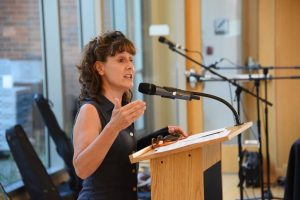
In an effort to improve workplace safety for Oregon’s low wage, immigrant workforce, NWJP kicked off a conversation about workplace injuries last month with the help of national expert, Dr. Celeste Monforton. Dr. Monforton, a faculty member at the George Washington University School of Public Health, was in Portland to speak at the NWJP 2016 Celebration of Worker Justice. She shared inspiring stories of successful organizing and action at workplaces across the country which led to safer working conditions.
Prior to her remarks, Dr. Monforton participated in a roundtable discussion with some of the top worker safety advocates in Oregon. Representatives from community organizations, labor unions, faith groups, government, and workers’ compensation law attended the meeting.
Lead by NWJP, the group discussed issues facing workers, the difficulty of preventing injuries in low wage industries, retaliation by employers, and limits of Oregon’s workers’ compensation system. The group met to begin a conversation about improving workers’ safety in Oregon through the establishment of a coalition of safety and health (COSH). COSH’s began forming across the U.S. in the late-1970’s as a unique way to raise attention to workers’ safety and make improvements. They exist in various forms and sizes throughout the country, but all share a similar focus: improving workplace safety. The discussion kicked off efforts by NWJP to begin establishing a COSH in Oregon.
Workers’ safety has been gaining more attention after a series of eye-opening articles detailing the dangerous working conditions for Oregon’s forestry workforce, which consists mostly of immigrant workers in the United States, many on H2B temporary foreign worker visas. Stories of their injuries, abuse, and exploitation prompted a legislative hearing last month in the Oregon Senate’s Interim Committee on Workforce.
In addition to workers’ testimony, the committee heard from advocates like Carl Wilmsen with the Northwest Forest Worker Center, and Joel Iboa of Beyond Toxics. Those advocates shared stories of workers being told by employers to lie after being injured on the job, a lack of access to clean drinking water and restrooms, and pesticide exposure. They urged the committee to adopt stronger inspection and enforcement standards, especially in the reforestation industry.
Despite the enormous challenges facing workers every day, Dr. Monforton ended her remarks on a hopeful note, citing efforts like COSHs’ and calling it “the most promising and exciting time to be part of the workers’ rights movement.”